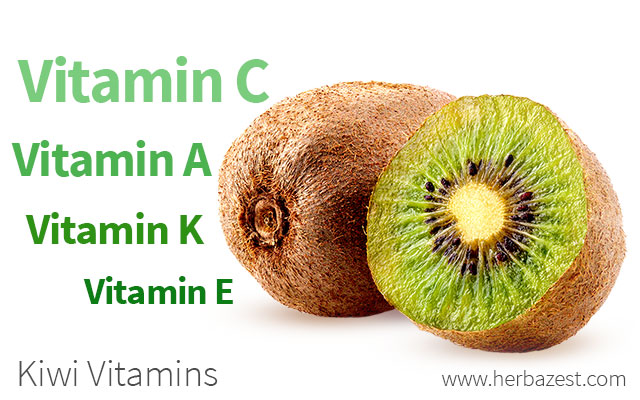Kiwi fruit is a great nutritious snack or meal addition that is praised for its succulent taste and its many health benefits. People consume kiwi to treat certain health conditions and boost overall health and performance. The vitamin C in kiwi works with the vitamin E to bring unique benefits, and both help protect the body from conditions such as cardiovascular disease and cellular damage caused by free radicals.
Vitamins in Kiwi and Recommended Daily Amounts
Vitamins are undeniably the most important compounds in kiwi nutrition:
Kiwi's vitamin C (ascorbic acid) is an essential nutrient that works as an antioxidant, protecting the body from DNA damage. An adequate daily intake of vitamin C is important to prevent scurvy and reduce the risk of developing chronic diseases.
100 GRAMS OF FRESH KIWI PROVIDE 92.7 MILLIGRAMS OF VITAMIN C, COVERING THE ADULT DAILY REQUIREMENTS FOR BOTH MEN (90 MG) AND WOMEN (75 MG).
Kiwi's vitamin E possesses antioxidant properties, along with immune function effects. While the recommended daily intake of vitamin E for adults is 15 mg, 100 grams of fresh kiwi fruit add a modest 1.46 mg.
Kiwi's vitamin K plays important role in human health beyond its well-established function in blood clotting. Scientific studies have consistently shown that vitamin K can improve bone health. 100 grams of fresh kiwi provide 40.3 mcg of vitamin K, contributing to achieve an impressive 34% of the recommended daily intake of for adults (120 mcg).
How to Make the Most of Kiwi's Vitamins
Kiwi vitamin content can vary depending on the cultivar, the conditions the fruit is exposed to, and the fruit component.
There are many kiwi varieties and cultivars, and all of them have significant levels of nutrients. However, some contain more vitamins than others.
THE BEST WAY TO POTENTIATE YOUR INTAKE OF KIWI VITAMINS IS TO CONSUME THE POPULAR 'HAYWARD' KIWI CULTIVAR.
The kiwi fruit is harvested early, so that by the time it is packaged, shipped, and stored, it will have ripened and be ready for consumption. A number of studies have found that the more mature the fruit becomes, the lower the vitamin content will be.
Additionally, the levels of vitamin C in kiwi vary depending on the layers that make up the fruit. Kiwi seeds are higher in vitamin C than the core and skin, while kiwi's vitamin E content is concentrated in the flesh of the fruit.
Vitamins in Kiwi vs. Other Fruits
The orange has a big reputation for being the go-to fruit for vitamin C, but kiwi actually has almost 25% higher levels per 100 grams. An added benefit of choosing kiwi over oranges for vitamin C intake is its vitamin E content, which is not found in oranges. While it is true that a couple of kiwifruits per day exceed the daily allowance for ascorbic acid, the exotic camu camu is currently recognized as the fruit with the highest vitamin C content, boasting about 30 times more than oranges.
Many years ago, kiwi fruit and Chinese gooseberry were though to be the same. However, one characteristic that separates the two is their vitamin content. Chinese gooseberries contain considerably less vitamin C, with only 27.7 mg per 100 g, and less vitamin E, with 0.37 mg per 100 g.
Because of their impressive amounts of vitamin C and the fact that they also provide other essential nutrients that are highly beneficial for human health, kiwi fruits are a great addition to any balanced diet.
Sources
- National Institutes of Health, Vitamin A | Vitamin C | Vitamin E | Vitamin K
- Nutritional Benefits of Kiwifruit, pp. 33-48, 60-67
- USDA Nutrient Database, Kiwifruit, green, raw
- Nutrition Journal, Vitamin K and bone health, 2001
- Advances in Food and Nutrition Research, The bioavailability of vitamin C from kiwifruit, 2013




